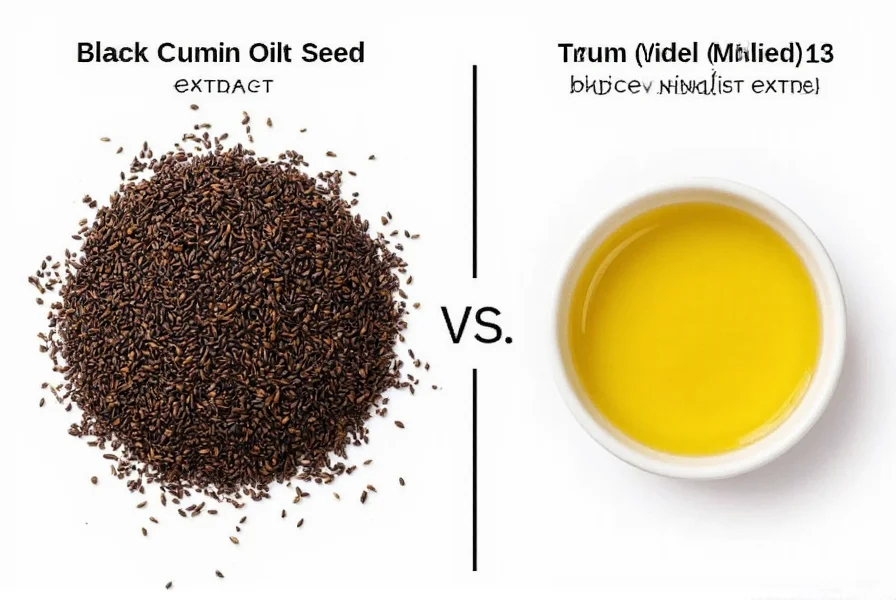Black cumin seed extract has gained significant attention in both traditional medicine and modern scientific research. This concentrated form of Nigella sativa seeds offers higher potency of active compounds compared to regular black seed oil. Understanding its properties, evidence-based benefits, and appropriate usage is essential for anyone considering this natural supplement.
What Exactly Is Black Cumin Seed Extract?
Black cumin seed extract comes from the seeds of Nigella sativa, a flowering plant native to Southwest Asia. Unlike regular black seed oil, which is typically cold-pressed, the extract undergoes additional processing to concentrate specific bioactive compounds, particularly thymoquinone. This standardization process creates a more potent product with consistent active ingredient levels.
Historically, various cultures have used black cumin seeds for thousands of years. Ancient Egyptian, Greek, and Islamic medical traditions documented its applications for respiratory health, digestion, and skin conditions. Modern extraction methods allow for precise concentration of beneficial compounds while removing less desirable elements.
Key Active Compounds in Black Cumin Seed Extract
The therapeutic potential of black cumin seed extract primarily stems from its complex phytochemical profile. The most researched compound is thymoquinone, which typically constitutes 0.2-5% of the extract depending on standardization. Other important components include:
| Compound | Natural Percentage | Primary Properties |
|---|---|---|
| Thymoquinone | 0.2-5% | Antioxidant, anti-inflammatory, potential anticancer properties |
| P-cymene | 20-40% | Antimicrobial, anti-inflammatory effects |
| Thymol | 5-15% | Antiseptic, antioxidant properties |
| Nigellone | Trace amounts | Anti-asthmatic, bronchodilatory effects |
Thymoquinone represents the most scientifically studied component, responsible for many of the extract's documented health effects. Its concentration directly impacts the extract's potency and potential therapeutic applications.
Evaluating the Scientific Evidence
When examining black cumin seed extract research, it's crucial to distinguish between preliminary findings and clinically proven benefits. Current evidence exists at multiple levels:
- Strongest evidence: Anti-inflammatory and antioxidant effects demonstrated consistently across multiple laboratory and animal studies
- Moderate evidence: Potential benefits for metabolic health markers in human clinical trials
- Preliminary evidence: Various other potential applications requiring more extensive human research
A 2022 meta-analysis published in the Journal of Ethnopharmacology reviewed 37 clinical trials involving black cumin seed extract. The analysis concluded that standardized extracts showed statistically significant improvements in inflammatory markers compared to placebo, with the most consistent results appearing at doses of 500-1000mg daily containing at least 3% thymoquinone.
Documented Health Benefits and Applications
Based on current scientific understanding, black cumin seed extract demonstrates several evidence-supported applications:
Inflammation Reduction
Multiple studies indicate black cumin seed extract's effectiveness in reducing inflammatory markers. Research published in Immunology Letters demonstrated that thymoquinone inhibits key inflammatory pathways, particularly the NF-kB signaling pathway. This mechanism explains its potential benefits for conditions involving chronic inflammation.
Antioxidant Protection
The extract shows potent antioxidant activity, helping protect cells from oxidative damage. A comparative study in Oxidative Medicine and Cellular Longevity found that black cumin seed extract demonstrated stronger free radical scavenging ability than several common antioxidant supplements when measured by ORAC (Oxygen Radical Absorbance Capacity) values.
Immune System Modulation
Unlike many immune boosters that simply stimulate the immune system, black cumin seed extract appears to modulate immune function. Research suggests it may help balance immune responses, potentially benefiting both underactive and overactive immune conditions. This dual-action characteristic makes it particularly interesting for autoimmune research.
Safety Profile and Usage Considerations
Understanding proper usage of black cumin seed extract is essential for safe and effective application:
Dosage Guidelines
Most clinical studies use standardized extracts providing 50-150mg of thymoquinone daily, typically achieved through 500-1000mg of 3-5% standardized extract. Starting with lower doses and gradually increasing allows assessment of individual tolerance. Therapeutic effects often require consistent use for 4-8 weeks.
Potential Side Effects
Black cumin seed extract is generally well-tolerated at recommended doses. Some individuals may experience mild gastrointestinal effects, particularly when starting supplementation. Rare cases of allergic skin reactions have been reported. The extract may interact with certain medications metabolized by the CYP3A4 enzyme system.
Contraindications
Pregnant women should avoid therapeutic doses due to potential uterine stimulation effects observed in animal studies. Individuals scheduled for surgery should discontinue use at least two weeks beforehand due to potential effects on blood clotting. Those with autoimmune conditions should consult healthcare providers before use, as immune modulation could affect disease management.

Selecting Quality Black Cumin Seed Extract Products
Not all black cumin seed extracts deliver equivalent benefits. Consider these factors when evaluating products:
- Standardization: Look for products specifying thymoquinone content (typically 2-5%)
- Extraction method: Supercritical CO2 extraction generally preserves more active compounds than solvent-based methods
- Third-party testing: Reputable brands provide certificates of analysis verifying potency and purity
- Formulation: Some products include bioavailability enhancers like piperine
Be wary of products making exaggerated health claims or promising immediate results. High-quality black cumin seed extract represents a supportive supplement rather than a miracle cure. The most reliable products come from companies with transparent manufacturing practices and scientific backing for their formulations.
Current Research Limitations and Future Directions
While promising, black cumin seed extract research has several limitations. Many human studies have small sample sizes, short durations, or lack rigorous methodology. Most evidence comes from laboratory and animal studies, which don't always translate directly to human applications.
Future research directions include larger, longer-term human trials, standardized dosing protocols, and investigation of specific therapeutic applications. Researchers are particularly interested in the extract's potential role in metabolic health, respiratory conditions, and as an adjunct to conventional cancer treatments.
Conclusion
Black cumin seed extract represents a promising natural compound with growing scientific support for specific health applications. Its anti-inflammatory and antioxidant properties show the strongest evidence, while other potential benefits require further research. When considering this supplement, prioritize quality products with verified thymoquinone content and consult healthcare professionals, especially if managing health conditions or taking medications. As research continues to evolve, our understanding of this ancient remedy's modern applications will likely expand significantly.










 浙公网安备
33010002000092号
浙公网安备
33010002000092号 浙B2-20120091-4
浙B2-20120091-4